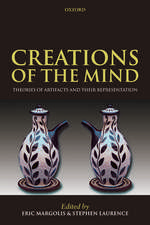Arguing About the Mind: Arguing About Philosophy
Editat de Brie Gertler, Lawrence Shapiroen Limba Engleză Paperback – 14 mai 2007
- the problem of consciousness
- the nature of the mind
- the relationship between the mind, body and world
- the notion of selfhood
- pathologies and behavioural problems
- animal, machine and extra-terrestrial intelligence.
Preț: 461.06 lei
Nou
Puncte Express: 692
Preț estimativ în valută:
88.22€ • 92.11$ • 73.02£
88.22€ • 92.11$ • 73.02£
Carte tipărită la comandă
Livrare economică 05-19 aprilie
Preluare comenzi: 021 569.72.76
Specificații
ISBN-13: 9780415771634
ISBN-10: 0415771633
Pagini: 624
Ilustrații: 2 black & white tables, 7 black & white line drawings
Dimensiuni: 174 x 246 x 47 mm
Greutate: 1.04 kg
Ediția:1
Editura: Taylor & Francis
Colecția Routledge
Seria Arguing About Philosophy
Locul publicării:Oxford, United Kingdom
ISBN-10: 0415771633
Pagini: 624
Ilustrații: 2 black & white tables, 7 black & white line drawings
Dimensiuni: 174 x 246 x 47 mm
Greutate: 1.04 kg
Ediția:1
Editura: Taylor & Francis
Colecția Routledge
Seria Arguing About Philosophy
Locul publicării:Oxford, United Kingdom
Public țintă
UndergraduateCuprins
Introduction Part 1: Consciousness: What is the Problem? 2. The Problem of Consciousness Julian Jaynes 3. The Puzzle of Conscious Experience David Chalmers 4. The Hornswoggle Problem Patricia Churchland 5. Mind Thomas Nagel 6. Science and the Phenomenal Jenann Ismael Part 2: Consciousness: How Should it be Studied? 7. Science, Publicity, and Consciousness Alvin I. Goldman 8. Who’s on First? Heterophenomenology Explained Daniel Dennett 9. Three Facets of Consciousness D. W. Smith Part 3: Is the Mind Physical? 10. An Argument for Dualism W.D. Hart 11. The Case for Materialism David Papineau 12. What is the Soul? Bertrand Russell 13. Post-Physicalism Barbara Montero Part 4: How is Your Mind Related to Your Body? How is it Related to the World? 14. Meditations René Descartes 15. Bodily Awareness and the Self Bill Brewer 16. The Extended Mind Andy Clark & Dave Chalmers 17. Overextending the Mind Brie Gertler Part 5: What is the Self? 18. Brain Bisection and the Unity of Consciousness Thomas Nagel 19. Divided Minds and the Nature of Persons Derek Parfit 20. The Self as a Center of Narrative Gravity Daniel Dennett 21. A Fallacy of Our Age Galen Strawson 22. There is no Problem of the Self Eric Olson Part 6: What Can Pathological Cases Teach us About the Mind? 23. The Unbearable Likeness of Being V. S. Ramachandran & Sandra Blakeslee 24. Reconceiving Delusion G. Lynn Stephens & George Graham 25. Does the Autistic Child have a 'Theory of Mind' Simon Baron-Cohen, Alan M. Leslie and Uta Frith 26. Autism and the ‘Theory of Mind’ Debate Robert M. Gordon & John A. Barker 27. Autism as Mind-Blindness: An Elaboration and Partial Defence Peter Carruthers 28. Free Will, Moral Responsibility and ADHD Gordon Tait 29. Alcohol Addiction and Responsibility Attributions Ferdinand. Schoeman Part 7: How Can we Know Whether—and What—Non-Human Animals Think? 30. How to Read Minds in Behaviour: A Suggestion from a Philosopher Jonathan Bennett 31. The Mental Life of Nonhuman Animals John Dupré 32. Can Animals Empathize? Yes Gordon Gallup Jr. 33. Can Animals Empathize? Maybe Not Daniel Povinelli 34. Apes with Language Sue Rumbaugh Savage, Stuart Shanker and Talbot J. Taylor 35. Behind the Ape’s Appearance: Escaping Anthropocentrism in the Study of Other Minds Daniel Povinelli Part 8: Can Machines Think? 36. Computing Machinery and Intelligence A. M. Turing 37. Minds, Brains, and Programs John R. Searle 38. The Curious Case of the Chinese Room J. Copeland 39. Can machines think? Daniel Dennett 40. Subcognition and the Limits of the Turing Test Robert M. French Part 9: Is There Intelligent Life on Other Planets? 41. The Drake Equation Robert Naeye 42. Can SETI Succeed? Not Likely Ernst Mayr 43. The Abundance of Life-Bearing Planets Carl Sagan 44. Response to Sagan Ernst Mayr 45. Response to Mayr Carl Sagan 46. The Decoding Problem: Do We Need to Search for Extra Terrestrial Intelligence to Search for Extraterrestrial Intelligence? Neil Tennant. Index
Recenzii
'I think this is brilliant. In conception and execution, the anthology does something which is both original and needed as a teaching resource ... the editors motivate the philosophical questions in a fresh and illuminating way, with an excellent choice of readings based around problems which will have occurred to most thoughtful philosophy students.' – Tim Crane, University College London, UK
'Arguing About the Mind makes use of original sources to introduce problems in the philosophy of mind in a way calculated to be intelligible to readers with no previous background in philosophy. By relying on readings intended for a broad audience, Gertler and Shapiro deftly sidestep technical disputes of the kind that too often deter students encountering serious philosophical writing for the first time. The result is a stunning topical introduction to philosophy via the philosophy of mind.' – John Heil, Washington University in St Louis, USA
'Arguing About the Mind makes use of original sources to introduce problems in the philosophy of mind in a way calculated to be intelligible to readers with no previous background in philosophy. By relying on readings intended for a broad audience, Gertler and Shapiro deftly sidestep technical disputes of the kind that too often deter students encountering serious philosophical writing for the first time. The result is a stunning topical introduction to philosophy via the philosophy of mind.' John Heil, Washington University in St Louis, USA
'I think this is brilliant. In conception and execution, the anthology does something which is both original and needed as a teaching resource. Instead of taking tired old routes, the editors motivate the philosophical questions in a fresh and illuminating way, with an excellent choice of readings based around problems which will have occurred to most thoughtful philosophy students.' Tim Crane, University College London, UK
'An excellent, comprehensive selection of key papers that are accessible to entry-level students.' Ron Chrisley, University of Sussex, UK
'I recommend Arguing About the Mind to psychologists, in graduate school and beyond, but with some qualification. If you regularly keep up with journals such as Mind or Journal of Consciousness Studies, the readings in this book, aimed at students who may be taking their first course in philosophy of mind, may already be familiar to you. The chapters are original pieces from primary sources but are selected to be readable by a general audience, and each section is preceded by the editors' overview and a list of 'Questions to Think About.' But if, like me, you have not considered psychological questions from a philosophical perspective since graduate school, the book is well worth your time, at least for dipping into, and the overviews and questions are helpful.' Jeffrey Noel, PsycCritiques
'Arguing About the Mind makes use of original sources to introduce problems in the philosophy of mind in a way calculated to be intelligible to readers with no previous background in philosophy. By relying on readings intended for a broad audience, Gertler and Shapiro deftly sidestep technical disputes of the kind that too often deter students encountering serious philosophical writing for the first time. The result is a stunning topical introduction to philosophy via the philosophy of mind.' – John Heil, Washington University in St Louis, USA
'Arguing About the Mind makes use of original sources to introduce problems in the philosophy of mind in a way calculated to be intelligible to readers with no previous background in philosophy. By relying on readings intended for a broad audience, Gertler and Shapiro deftly sidestep technical disputes of the kind that too often deter students encountering serious philosophical writing for the first time. The result is a stunning topical introduction to philosophy via the philosophy of mind.' John Heil, Washington University in St Louis, USA
'I think this is brilliant. In conception and execution, the anthology does something which is both original and needed as a teaching resource. Instead of taking tired old routes, the editors motivate the philosophical questions in a fresh and illuminating way, with an excellent choice of readings based around problems which will have occurred to most thoughtful philosophy students.' Tim Crane, University College London, UK
'An excellent, comprehensive selection of key papers that are accessible to entry-level students.' Ron Chrisley, University of Sussex, UK
'I recommend Arguing About the Mind to psychologists, in graduate school and beyond, but with some qualification. If you regularly keep up with journals such as Mind or Journal of Consciousness Studies, the readings in this book, aimed at students who may be taking their first course in philosophy of mind, may already be familiar to you. The chapters are original pieces from primary sources but are selected to be readable by a general audience, and each section is preceded by the editors' overview and a list of 'Questions to Think About.' But if, like me, you have not considered psychological questions from a philosophical perspective since graduate school, the book is well worth your time, at least for dipping into, and the overviews and questions are helpful.' Jeffrey Noel, PsycCritiques
Descriere
An accessible and engaging introductory reader that explores a broad range of topics and key arguments on the philosophy of mind.


























